A beginner's 7-day low-carb meal plan can kickstart your journey toward better health and weight management. You'll want to reduce sugary foods, bread, and pasta while focusing on lean proteins, healthy fats, and non-starchy vegetables. Start your day with protein-rich options like eggs or Greek yogurt, and enjoy salads for lunch. Dinner should feature balanced plates with vegetables and healthy fats. Snacks can include nuts, cheese sticks, or veggie slices with hummus. Planning and meal prep will help you stay on track and satisfied. You'll discover more tips and recipes to enhance your low-carb experience as you explore further.
Key Takeaways
- Start with a clear meal plan for the week, focusing on proteins, healthy fats, and low-carb vegetables.
- Prepare shopping lists prioritizing fresh produce, lean meats, and healthy fats essential for low-carb meals.
- Incorporate easy recipes like salads, stir-fries, and snacks such as nuts or cheese to maintain variety and satisfaction.
- Use meal prep containers to portion out meals and keep them fresh for the week.
- Track your progress and adjust your meal plan based on how your body responds to the low-carb diet.
Understanding Low-Carb Diets
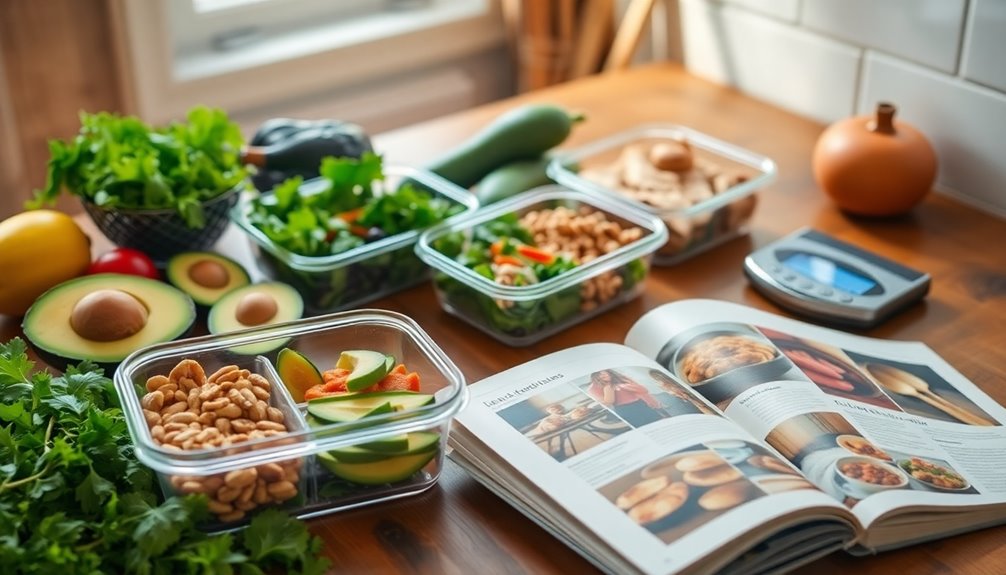
Low-carb diets are often praised for their effectiveness in promoting weight loss and enhancing overall health. When considering a low-carb approach, comprehending the types of carbohydrate sources you're reducing becomes crucial. These commonly consist of sugary foods, bread, pasta, and numerous processed snacks. Instead, the focus shifts to integrating proteins, healthy fats, and non-starchy vegetables.
The impact on metabolism is significant when you decrease your carb intake. By diminishing carbohydrates, your body transitions from utilizing glucose as its primary energy source to depending on fat. This metabolic shift can aid in burning fat more effectively, a fundamental reason why many individuals achieve success with low-carb diets.
You might observe feeling satiated for longer periods, reducing the desire to snack, thereby supporting your weight loss journey.
Furthermore, reducing carb consumption can result in decreased insulin levels, enabling easier access to stored fat by your body. This alteration not only boosts fat burning but also enhances your energy levels throughout the day. Additionally, you can benefit from a comprehensive program like Adaptive Body Boost(#) that provides structured guidance on meal planning and exercise.
Embracing a low-carb lifestyle doesn't entail relinquishing delightful meals; it involves making wiser choices and comprehending how various foods impact your body. By adopting this method, you can nurture a deeper understanding of your eating patterns and engage with a supportive community of individuals who share similar goals.
Benefits of Low-Carb Eating

When you adopt a low-carb eating plan, you can experience a range of health benefits that extend beyond weight loss. One of the most notable advantages is the potential for enhanced energy levels. By reducing your intake of carbohydrates, you're likely to stabilize your blood sugar, leading to fewer energy crashes and greater overall vigor throughout the day. This steady energy can help you stay active, focused, and motivated, enhancing your daily activities and productivity.
Additionally, many people find that a low-carb diet helps curb cravings for sugary snacks, which can aid in weight loss. When your body adapts to burning fat for fuel instead of carbs, you may notice a decrease in hunger pangs, making it easier to stick to your meal plan without feeling deprived. This shift can also promote a healthier relationship with food, as you're less likely to engage in mindless eating or bingeing on high-carb items.
Moreover, low-carb eating has been linked to improved metabolic health markers. Research suggests that it can reduce insulin resistance and lower levels of triglycerides, which can contribute to better heart health. As you enjoy these benefits, you'll likely find community support from others who share similar goals, creating a sense of camaraderie that can enhance your journey. Furthermore, utilizing progress tracking tools can greatly assist in maintaining your low-carb lifestyle and achieving your health objectives.
Meal Prep Essentials
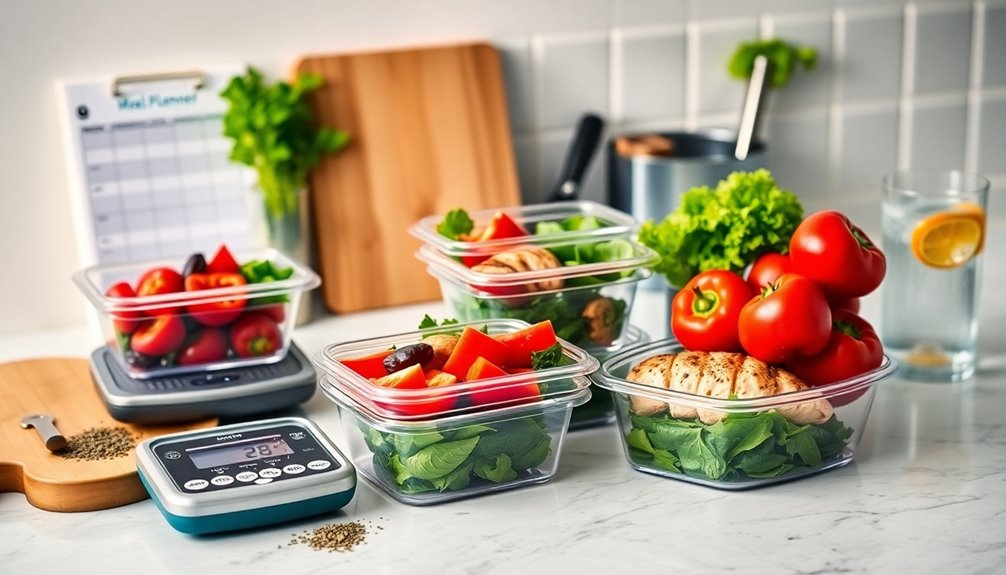
To make the most of your low-carb journey, having a solid meal prep strategy can greatly enhance your success. Not only does it help with time management, but it also supports effective budget planning. With the right essentials in place, you can streamline your cooking process and guarantee you're eating delicious, low-carb meals throughout the week.
Here are four must-have meal prep essentials:
- Quality Containers: Invest in airtight, microwave-safe containers. They'll keep your meals fresh and make it easy to portion out servings. Choose a variety of sizes to accommodate different meal types.
- Kitchen Scale: A digital kitchen scale helps you accurately measure ingredients, which is essential for sticking to low-carb guidelines. You can track your portions and guarantee you're getting the right macronutrients.
- Sharp Knives and Cutting Boards: Efficient chopping and slicing are crucial to speeding up your prep time. A good set of knives and durable cutting boards will make your food prep more enjoyable and less time-consuming.
- Meal Planning App: Utilize an app or planner to organize your recipes and grocery lists. This can simplify your shopping and guarantee you stay on track with your budget planning. Additionally, incorporating mini band workouts can complement your low-carb diet by enhancing muscle tone and boosting metabolism.
Grocery List for Success
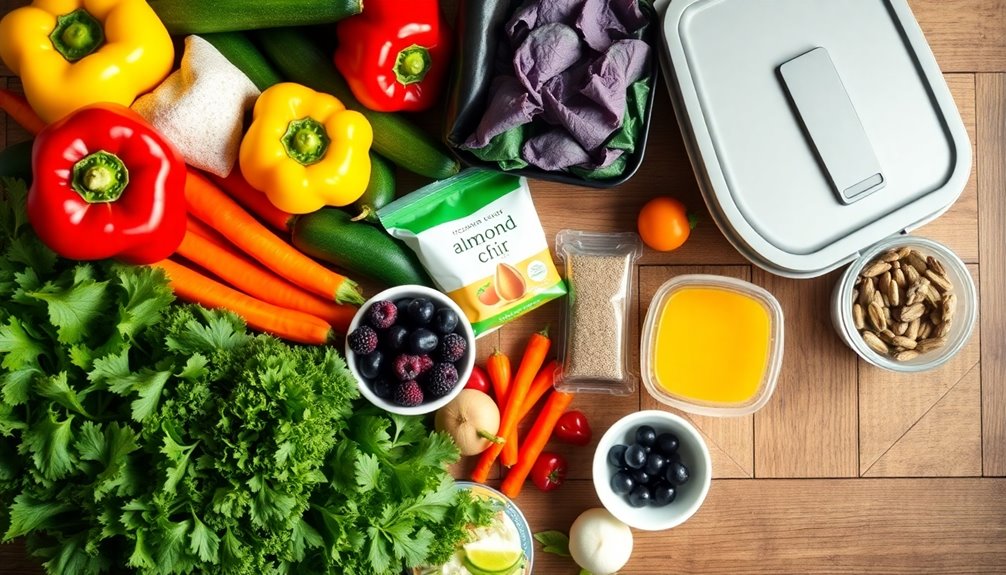
Stock your kitchen with the right ingredients to set yourself up for low-carb success. A well-thought-out grocery list is essential for effective meal planning, ensuring you have everything you need without the temptation of impulse buys.
Start by focusing on fresh produce like leafy greens, broccoli, and zucchini, which are low in carbs and high in nutrients. Incorporate a variety of colorful vegetables to keep your meals exciting and satisfying.
Next, don't forget your protein sources. Stock up on lean meats like chicken, turkey, and fish, as well as eggs, which are versatile and perfect for quick meals. For those who prefer plant-based options, consider tofu, tempeh, or legumes in moderation.
Healthy fats are equally vital in a low-carb diet. Look for avocados, nuts, seeds, and healthy oils such as olive or avocado oil. These not only enhance flavor but also help keep you feeling full. A plant-based diet can provide significant health benefits while still focusing on low-carb options.
When it comes to shopping strategies, always stick to your list to avoid unnecessary purchases that can derail your low-carb goals. Consider shopping the perimeter of the store, where fresh foods are typically located, and avoid the aisles filled with processed snacks and sugary treats.
Daily Meal Plan Overview

With the right ingredients in your kitchen, you're ready to start on a successful low-carb journey. A well-structured daily meal plan not only simplifies your meals but also helps you stay on track. Here's an overview to guide you through your week:
- Breakfast: Start your day with protein-rich options like eggs or Greek yogurt. These foods will keep you full and energized, making it easier to practice portion control. Incorporating plant-based protein sources into your breakfast can also provide essential amino acids for muscle synthesis.
- Lunch: Focus on leafy greens and lean proteins for lunch. Salads topped with grilled chicken or tuna are perfect carb swaps for traditional sandwiches, allowing you to enjoy a satisfying meal without the carbs.
- Dinner: For dinner, aim for a balanced plate filled with vegetables and healthy fats. Consider grilled salmon with asparagus, which not only tastes great but also supports your low-carb goals.
- Snacks: Keep healthy snacks on hand, like nuts or cheese slices. These options help curb hunger between meals and are excellent for practicing portion control.
Easy Low-Carb Recipes
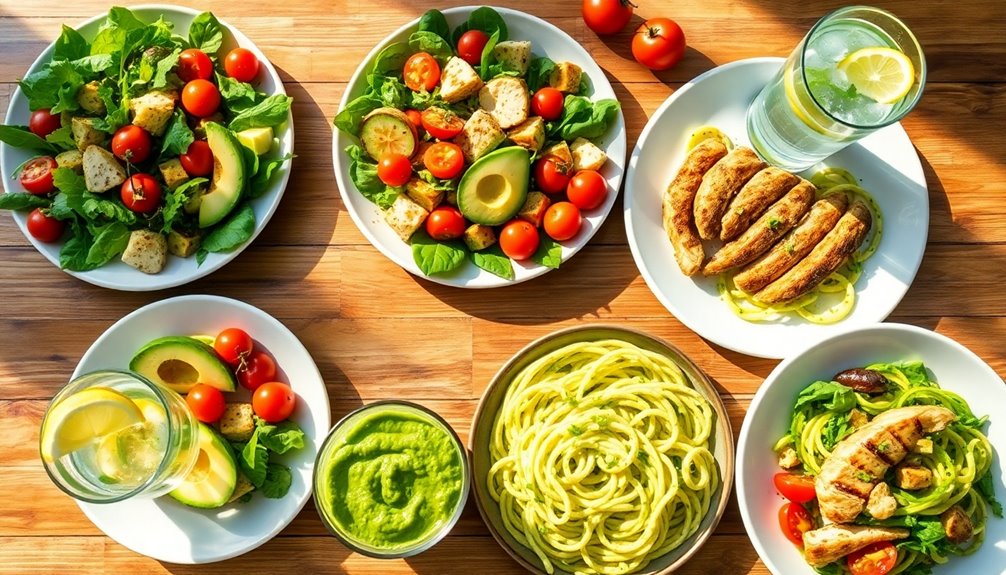
Finding easy low-carb recipes can make your meal prep enjoyable and stress-free. By focusing on simple, wholesome ingredients, you can whip up delicious dishes without feeling overwhelmed.
Start your day right with quick breakfasts that fuel your energy while keeping carbs in check. For instance, scrambled eggs with spinach and feta provide a protein-packed start, while chia seed pudding topped with berries offers a sweet, satisfying option that's low on carbs.
When hunger strikes between meals, having tasty snacks on hand is essential. Consider prepping sliced cucumbers with hummus or cheese sticks for a crunchy, satisfying treat. Another great option is homemade kale chips, which are easy to make and packed with nutrients. You'll find that these snacks not only keep you full but also support your low-carb lifestyle.
Don't forget about versatile meals like zucchini noodles tossed with pesto and grilled chicken. This dish is both light and flavorful, proving that low-carb doesn't mean sacrificing taste.
For dessert, try a simple mug cake made with almond flour, cocoa powder, and a touch of sweetener. It's a quick way to indulge your sweet tooth while staying on track. Additionally, incorporating keto breads into your meal plan can provide satisfying alternatives without the negative effects of traditional bread.
Tips for Staying on Track
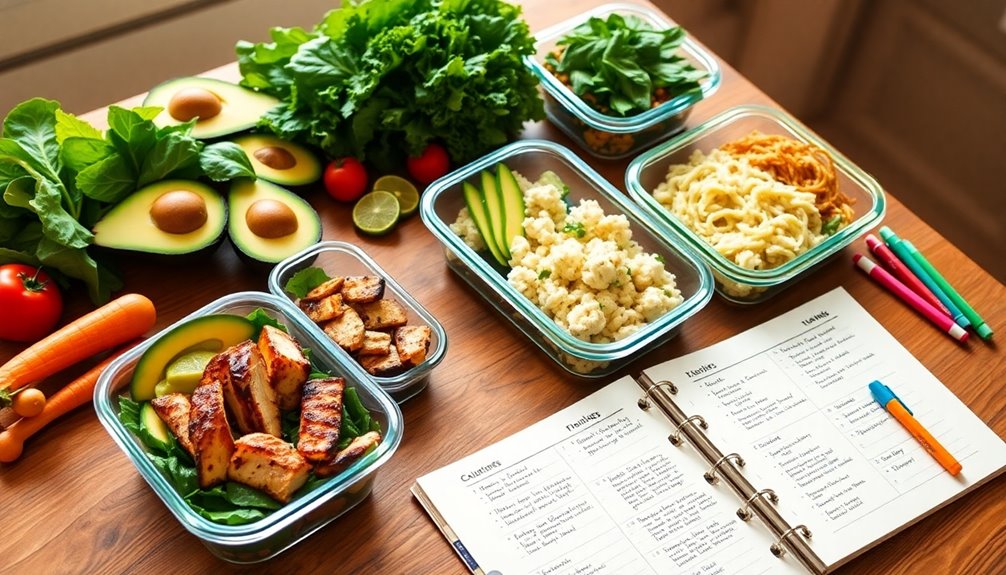
Staying on track with your low-carb meal plan can be challenging, but having a few strategies in place makes it easier. By incorporating mindful eating and practicing portion control, you can enjoy your meals while keeping cravings at bay. Here are four tips to help you stay focused:
- Plan Your Meals: Take time each week to plan your meals. Having a structured plan reduces the temptation to stray from your low-carb guidelines. Plus, it saves time during busy days.
- Practice Mindful Eating: Slow down and savor each bite. By paying attention to the flavors and textures of your food, you're more likely to feel satisfied and less inclined to overeat. Mindful eating can also help you recognize when you're truly hungry versus eating out of boredom.
- Control Your Portions: Use smaller plates and bowls to manage portion sizes effectively. This simple trick can help you feel full without overindulging. Remember, it's not just about what you eat but how much you consume.
- Stay Hydrated: Sometimes, thirst can be mistaken for hunger. Drinking water throughout the day can help curb unnecessary snacking. Aim for at least eight glasses daily to keep your body well-hydrated and functioning efficiently.
Additionally, practicing mindfulness meditation can enhance your focus and help you stay committed to your meal plan.
Maintaining Your Low-Carb Lifestyle

Maintaining a low-carb lifestyle requires commitment, but it can be seamlessly integrated into your daily routine. To help you stay on track, finding satisfying carb substitutes and making smart choices when eating out play a significant role. These strategies not only keep you aligned with your goals but also help you feel included in social situations.
When substituting carbohydrates, focus on foods that satisfy your cravings without derailing your progress. Here are some effective options:
| Carb Substitutes | Traditional Carbs |
|---|---|
| Zucchini noodles | Pasta |
| Cauliflower rice | White rice |
| Almond flour | All-purpose flour |
When you're eating out, approaching menus with a game plan is vital. Don't hesitate to ask for modifications—most restaurants are accommodating and can help you swap out starchy sides for veggies or salad. Opting for grilled meats and seafood can also keep your meals low in carbs while still being delicious. Incorporating delicious Keto recipes into your meal planning can enhance your low-carb dining experiences.
Frequently Asked Questions
Can I Drink Alcohol on a Low-Carb Diet?
Yes, you can drink alcohol on a low-carb diet, but you'll want to choose wisely. Opt for low carb beverages like spirits mixed with soda water or dry wines, which have fewer carbohydrates. Keep in mind that alcohol consumption can affect your metabolism and cravings, so moderation is key.
Enjoying a drink with friends can still fit into your lifestyle, just be mindful of your choices to stay on track with your goals.
How Do I Handle Cravings While Low-Carb?
Cravings can feel like that annoying friend who won't leave the party. But hey, you're not alone!
Embrace mindful eating—really tune into what your body needs. Instead of reaching for that sugary snack, consider healthy substitutions like nuts or berries. They satisfy without sabotaging your goals.
Is Exercise Necessary for Low-Carb Weight Loss?
Exercise isn't absolutely necessary for weight loss on a low-carb diet, but it offers significant benefits. Incorporating regular physical activity can boost your metabolism, enhance fat loss, and improve overall health.
It also helps you manage cravings and maintain muscle mass, which is essential as you shed pounds. So, while you can lose weight without it, combining exercise with your low-carb approach can lead to even better results and a healthier lifestyle.
Can I Still Eat Snacks on This Meal Plan?
Imagine a painter selecting vibrant colors for a masterpiece; your snacks can be just as colorful and fulfilling!
Yes, you can still enjoy snacks, but focus on healthy alternatives like nuts, cheese, or veggie sticks.
Practicing portion control is key—think of it as adding just the right touch to your canvas.
What Are Common Mistakes Beginners Make With Low-Carb Diets?
When starting a low-carb diet, you might overlook carb counting and portion control. Many beginners think they can eat unlimited low-carb foods, which can lead to excessive calorie intake. Monitoring your carbs and paying attention to portion sizes is crucial to avoid unwanted weight gain.
Conclusion
By following this 7-day low-carb meal plan, you're not just experimenting with a diet; you're embracing a lifestyle that can enhance your health and well-being. Research shows that low-carb diets can lead to weight loss, improved blood sugar levels, and increased energy. As you incorporate these meals and tips into your routine, you'll likely find it easier to stay on track and enjoy the benefits of this dietary approach. Start today, and see the difference for yourself!



